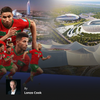Could nuclear energy one day power the Maghreb?
The Maghreb’s energy transition is a complex but critical journey towards sustainability and decarbonization as countries aim to meet

As the Women’s Africa Cup of Nations (WAFCON) unfolds across Morocco this July, the host is staging more than a sporting spectacle. The tournament — and the prominence of Morocco’s Atlas Lionesses — marks another step in a carefully calibrated strategy to project soft power through football. With the 2030 men’s World Cup on the horizon, which Morocco will co-host alongside Spain and Portugal, the kingdom is betting that sporting prowess will bolster its international standing and cement its role as a bridge between Africa and Europe.
Morocco’s footballing ascent, exemplified by the men’s historic World Cup semi-final run in 2022, is no accident. It stems from years of targeted investment — including a deliberate focus on women’s football. The country has developed professional leagues and built top-tier infrastructure. A centerpiece is the Mohammed VI Football Complex, a sprawling, state-of-the-art facility that supports both men’s and women’s squads and rivals Europe’s best academies. This equal investment in men’s and women’s football not only deepens the talent pool but also strengthens Morocco’s image as a forward-looking, inclusive sporting nation.
Hosting WAFCON for a second consecutive time offers a welcome rehearsal. With record-breaking attendance and continental attention, Morocco is testing its ability to manage international events. Officials are scrutinizing every detail — from crowd control to logistics — with an eye on refining operations ahead of more ambitious tasks.
Those will come quickly. In December 2025, Morocco will host the men’s Africa Cup of Nations (AFCON), its first since 1988. That, too, will serve as a trial run for the World Cup. The tournaments allow authorities to assess new stadiums, road and rail links, and a rapidly expanding hospitality sector — all while building institutional know-how in event management.
Beyond short-term boosts to construction, tourism and employment, Morocco’s sporting mega-events are designed to entrench its reputation as a stable, modernizing economy with global aspirations. The football pitch has become a diplomatic arena — one that aims to draw investment, foster cultural exchange, and deepen partnerships with allies in Europe, the Gulf and beyond.
Not everyone is cheering. Critics argue the lavish spending on stadiums and image-building comes amid perceived inequality, high youth unemployment and rural economic uncertainty. But Rabat appears undeterred. With the world watching in 2030, Morocco hopes to parlay sporting success into geopolitical influence — and prove that for soft power, football may be the country’s most effective playmaker.
*Lonzo Cook is a journalist and writer. He spent two decades at CNN in a series of senior editorial and management roles including leading breaking news operations across Asia, the Middle East and Latin America. He currently works as a senior communications strategist, partnering with corporations and executives to develop integrated communication strategies to connect with audiences in our fast paced, ever changing engagement landscape.
Sign up for the weekly newsletter and get our latest stories delivered straight to your inbox.